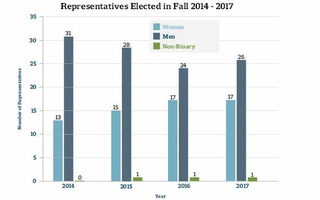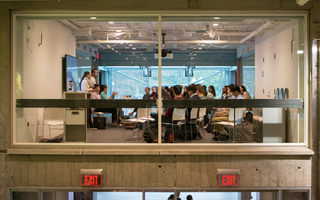{shortcode-f1d6bdaa8aaa345f7223656bb5ce2acdba9b5d5e}
Almost half of the Undergraduate Council representatives who served during the spring term will not be returning to the council, which will begin holding elections on Monday.
At least 23 representatives who served during the spring term — of 51 total members — are either declining to run for re-election or have resigned their positions in recent months. In addition, six former UC representatives graduated in May.
Of the at least 23 students who will not be returning to the Council this fall — a figure which could run higher if any current representatives lose their bids for re-election — eight resigned in the spring and 15 are not running for re-election.
Among the impacts of high turnover on the Council are a loss of several high-ranking members of the body, particularly on some of the UC’s committees.
The Finance Committee, which manages a roughly $300,000 budget — a figure which could jump after the student activities fee more than doubled this academic year — will be particularly hard hit, with nine of its 12 members leaving, including its chair.
Henry S. Atkins ’20, the Finance Committee chair, is among the 23 representatives who will not return this fall. As a member of the UC’s executive committee, Atkins did not need to run for re-election until the spring, however, he indicated that he was forced to choose between the Council and ROTC due to the high time commitments required by both activities.
“I’m leaving in order to better commit myself to Army ROTC here,” Atkins wrote. “I need to make sure I’m giving my fullest to the program this year.”
Several other UC executive committee members, who also did not need to stand for re-election this fall, are also resigning from the Council, including Council Secretary Jackson Walker ’21 and Rules Committee chair Wilfried J. Zibell ’21.
The number of UC representatives not returning to the Council this fall exceeds last year’s turnover. After the fall 2017 elections, 18 seats previously held by students still enrolled at the College turned over. In addition, the Council lost four members of the Class of 2017 who graduated.
Most of the UC representatives who are not returning to the Council did not respond to requests for comment or declined to comment. For those who provided a justification for their departure, many agreed with Atkins, citing the high time commitment associated with serving on the UC as a significant reason for not continuing to be involved.
Others, though, pointed to a desire to pursue other interests.
Eliot House Representative Nick Wyville ’20 wrote in an email that he decided that he wanted a different avenue to advocate for issues he cares about. He said he will be working with an organization that advocates for criminal justice reform, as well as supporting Democratic candidates in this fall’s midterm elections.
“As Harvard students we all have immense amounts of privilege and can afford to work on such niche issues that the UC works on, and I believe this is a time that we must step back and realize that about ourselves,” he wrote. “These times call for bolder action on a national political level, and that’s why I will be actively campaigning for Democrats until November, and not working on campus-specific issues.”
Though around half of the Council will turn over with the installation of new members later this month, UC President Catherine L. Zhang ’19 said the Council leaders would need to redouble efforts to ensure the body continued to operate efficiently in the wake of the elections.
“On the outside, it seems like a large turnover, but something that is important to us is having structures and having systems to be able to effectively train and help develop students to be leaders in their own capacity," she said.
The Finance Committee will lose three-quarters of its spring members, but returning members said they believe the committee’s operations will not be hampered.
“The Finance Committee has a very horizontal operating structure, so I think we should be fine,” said Dunster House Representative Victor C. Agbafe ’19. “A lot of it has been automated, we have a system through which we input all of the grants, so I really don’t see there being any problems with us getting student groups their money.”
Council Treasurer Nadine M. Khoury ’20, called the high number of exits on the Finance Committee, known as “FiComm,” “unfortunate,” predicting that she and other senior Council members would mostly likely need to at least temporarily fulfill additional roles.
“For a while, it might mean I have to do some of the lifting that a very seasoned FiComm chair would do until our FiComm chair learn the ropes,” she said.
—Staff writer Jonah S. Berger can be reached at jonah.berger@thecrimson.com.


















